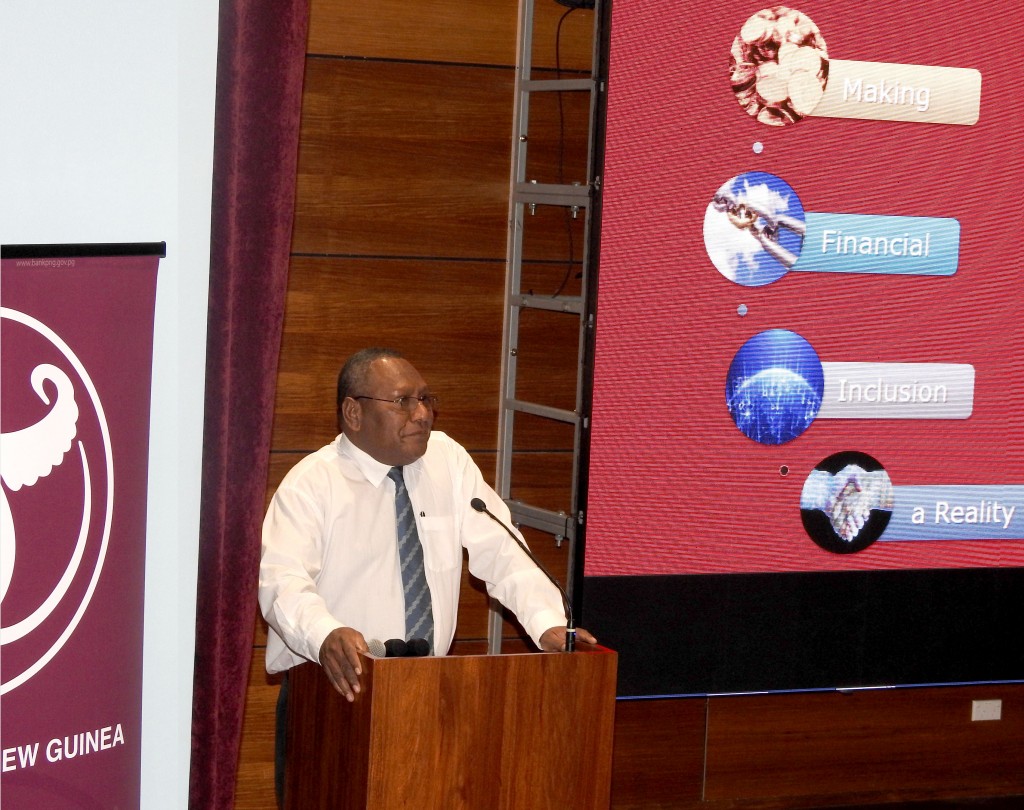Speech by Governor Loi M Bakani, CMG at the Blockchain Seminar at PNG Institute of Banking & Business Management (IBBM) Auditorium
18 August 2017 Bank of Papua New Guinea Blockchain Conference: Port Moresby
Thank you Assistant Governor Genia.
I would like to add my own personal welcome to all our participants in this very exciting day of learning and discovery.
To build on AG Genia’s often asked questions as to why BPNG is getting involved in Blockchain and Cryptocurrencies, it is the firm belief of the Bank that it has a duty and an obligation to the PNG citizenry and the Government to stay informed about new and emerging technologies. Ignorance is not an acceptable basis for good financial governance.
A key driver of the BPNG 2016 – 2020 Strategic Plan is Financial Inclusion – providing access to the full gamut of financial services to all PNG citizens as simply and easily as it can be; irrespective of educational ability, geographic location or income levels.
Our research to date has shown us that:
• Over 100 other Central Banks are currently engaged in Blockchain-type projects worldwide
• 80% banks are predicted to initiate Blockchain type initiatives before the end of 2017
• More than US$1.4 billion has been invested in Blockchain initiatives to Q1 2017
• Over 100 private Corporations have already joined up to Blockchain consortia so as to minimise their financial exposure but maximise their access to these new technologies and what opportunities they may represent in the short, medium and long term
• Nearly 3000 Blockchain-related patents have been filed in the US alone in the past 3 years
• More than 30 sovereign states are currently investigating Blockchain and cryptocurrency technologies
On this basis alone, we do not believe that BPNG simply cannot sit idly on the side-lines– it must take a proactive and enthusiastic part in exploring these technologies.
As the Regulator of the PNG financial system, BPNG must set standards, legislative controls and create the regulatory environment within which these technologies will operate into the future, for operate they will, despite the doubters and nay-sayers.
As other institutions around the world are discovering, these represent a massive challenge and BPNG is seeking to work with a number of international regulatory authorities to understand how best to meet these challenges.
Like the Internet, these challenges will not come easily but neither should we impede the adoption of these technologies because of such challenges. These include, but are not limited to:
• Regulation – how and what to regulate; like the Internet before, regulations will evolve in response to market forces but will cannot suppress development of these technologies
• Legislation & Jurisdiction – again, what and how? Some have suggested banking-style licensing for operators, some have suggested linking cryptocurrencies to a gold-type standard and others are advocating open marketplaces
• Data sovereignty – when transactions cross borders, where does sovereignty lie; this is an international issue, not a domestic one, and require an international response not unlike those agree for current international settlement systems perhaps
• Scale – many naysayers claim Blockchain-based technologies will not scale to meet serious commercial volumes of transactions but this has clearly been proven to be untrue. As the Regulator in an emerging market, BPNG is equally concerned about the capacity and capability for these technologies to handle very large volumes of very low value transactions as might be generated in micro-payment situations such as remittance payments
• Data Privacy – different jurisdictions have significantly different views as to what data should be permitted to be held offshore; previously we have talked about cloud based privacy policies, now we need to talk about cryptocurrency based privacy policies
• Standards – as has been the legacy of the ICT industry, “Standards” for software development, architecture, etc have come and gone; this will be the case for Blockchain and cryptocurrencies – we cannot sit around and wait for the answer
• Market Supervision, anti-corruption and counter terrorism financing – these technologies are already known to be a haven for such activities and as an industry we must first truly understand the technology before we can understand how the darker elements of our societies are using them for illicit purposes
However, like the Internet, these will be addressed as the technologies mature, solutions become more mainstream and solutions are discovered to address some but probably not all of the above.
In April 2017, the Australian Prime Minister, Malcolm Turnbull, was visiting PNG as part of a Heads of Government Meeting. He requested the Australian High Commission to create an Innovations Seminar to allow PNG companies to showcase their innovation projects. BPNG was the only Government Agency invited to present.
At this time, BPNG presented its prototype Identify Creation project called the “Papuany Box”. The PM was so impressed at what he saw, he spoke about it at length at both a formal dinner that evening and at a more informal business breakfast meeting the following day.
For BPNG, the PM summarised exactly the responses to the questions regularly put to BPNG about these technologies – “These technologies can help emerging markets leapfrog developed economies”.
As part of our seminar today, we are showcasing two examples of Blockchain & Cryptocurrency solutions that have been developed with a very PNG-centric flavour to them.
These are currently being field-trialled in PNG and without wishing to give too much away, I think you will find these both exciting and see the opportunities for their exploitation for the good of PNG and its citizens across many industries and Public Sector agencies.
I am confident that the rest of today will provide you all with some insights into some of the possibilities of these technologies, the opportunity to challenge the ways things are done today and give you all some food for thought to take back to your organisations to progress the innovation conversations I am sure are already beginning to be had across PNG businesses.

